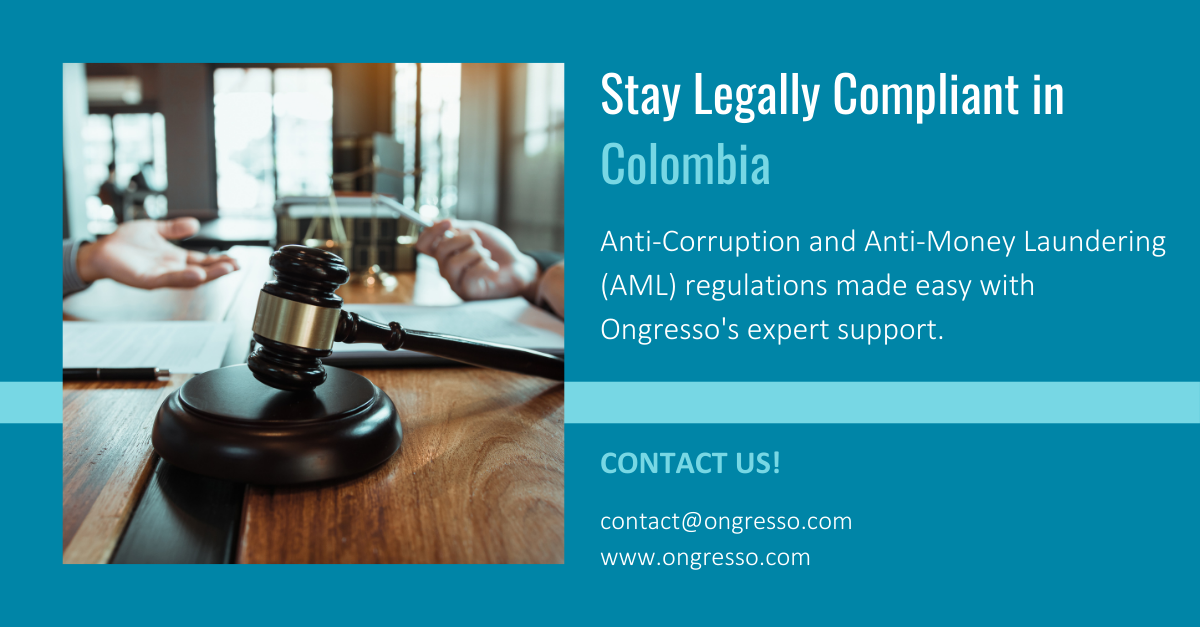Anti-Corruption and Anti-Money Laundering in Colombia
Colombia • March 18, 2025 • Written by: Ongresso - Business Beyond Borders

The complex landscape of anti-corruption and anti-money laundering (AML) regulations in Colombia can be daunting for businesses striving to maintain compliance while focusing on growth. Many companies struggle with understanding and implementing the stringent legal requirements, risking severe penalties and reputational damage. At Ongresso, we understand these challenges and offer specialized legal compliance services tailored to ensure your business operates within the legal framework. Our team of experts provides comprehensive support in establishing robust compliance programs, conducting thorough risk assessments, and maintaining detailed records, allowing you to focus on your core business activities with confidence and peace of mind.
Colombia has a robust legal framework aimed at combating corruption and money laundering. Businesses operating in Colombia must adhere to stringent regulations designed to prevent and detect illicit activities, ensuring transparency and integrity in their operations.
Key Anti-Corruption Laws
- Anti-Corruption Statute (Law 1474 of 2011)
- This law provides comprehensive measures to prevent and punish corruption in both the public and private sectors.
- It establishes procedures for reporting corruption, protecting whistleblowers, and implementing anti-corruption programs within organizations.
- Transparency and Access to Information Law (Law 1712 of 2014)
- This law promotes transparency by granting public access to information held by public entities and private entities performing public functions.
- It requires businesses to maintain and disclose accurate records of their operations and transactions.
- Penal Code
- The Penal Code includes specific provisions related to bribery, embezzlement, influence peddling, and other corrupt practices.
- It outlines severe penalties for individuals and companies found guilty of engaging in corrupt activities.
Key Anti-Money Laundering (AML) Regulations
- Law 1762 of 2015 (Anti-Smuggling Law)
- This law targets money laundering through smuggling activities, reinforcing controls and penalties to deter such practices.
- It mandates businesses to implement measures to identify and report suspicious transactions related to smuggling.
- Financial Information and Analysis Unit (UIAF) Regulations
- The UIAF is the primary regulatory body overseeing AML compliance in Colombia.
- Businesses are required to report suspicious transactions to the UIAF and implement internal controls to prevent money laundering.
- Circular Básica Jurídica (Superintendence of Companies)
- This regulation mandates businesses to establish and maintain a comprehensive AML program.
- It includes guidelines for customer due diligence, transaction monitoring, record-keeping, and reporting suspicious activities.

Compliance Requirements for Businesses
Risk Assessment and Management
Businesses must conduct regular risk assessments to identify potential exposure to corruption and money laundering. By understanding these risks, they can implement effective risk management strategies to mitigate identified threats, ensuring their operations remain compliant with legal standards.
Internal Controls and Procedures
Companies are required to establish robust internal controls and procedures to prevent and detect corruption and money laundering. This includes appointing a dedicated compliance officer, conducting regular audits, and ensuring employees are well-trained in AML and anti-corruption policies, which collectively safeguard the business against illicit activities.
Reporting and Record-Keeping
Maintaining detailed records of all transactions and reporting any suspicious activities to the relevant authorities is crucial for businesses. Compliance with reporting obligations to the Financial Information and Analysis Unit (UIAF) and other regulatory bodies ensures transparency and adherence to legal requirements, protecting the business from potential legal repercussions.
Employee Training and Awareness
Implementing continuous training programs is essential to ensure employees are aware of anti-corruption and AML regulations. By training employees to recognize and report suspicious activities, businesses can foster a culture of compliance and vigilance, further strengthening their defenses against corruption and money laundering.
Penalties for Non-Compliance
Non-compliance with anti-corruption and AML regulations can result in severe penalties, including:
- Heavy fines
- Revocation of business licenses
- Imprisonment for individuals involved
- Reputational damage
Why Choose Ongresso?
Choosing Ongresso as your trusted partner for legal compliance services in Colombia offers numerous advantages for your company:
- Save Time and Avoid Risk: Rely on Ongresso's extensive expertise to handle your annual compliance efficiently, mitigating risks and reducing the administrative burden on your business.
- Guaranteed Compliance: Ongresso's unique combination of legal and tax expertise ensures your company meets all local regulatory requirements, tailored specifically to your business goals.
- Holistic Compliance Oversight: From monitoring regulatory changes to managing all necessary filings, Ongresso provides a complete compliance solution that keeps your business on track and compliant.
- Comprehensive Support and Peace of Mind: With over 20 years of experience and a strong track record of managing compliance for global brands, Ongresso ensures your business operates smoothly and legally, allowing you to focus on growth and success.
Contact Ongresso today to discuss your unique requirements and discover how we can assist you in the Colombian market. We're excited to collaborate with you and ensure your success in Colombia!